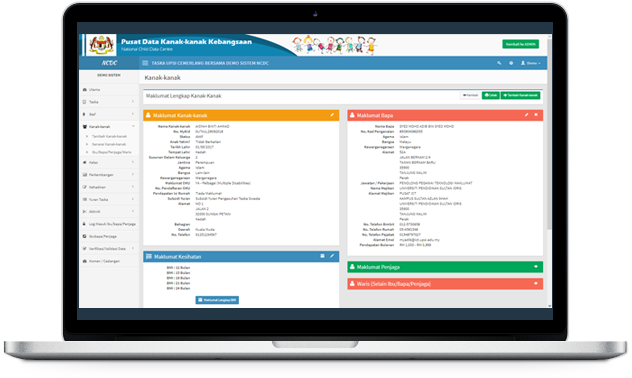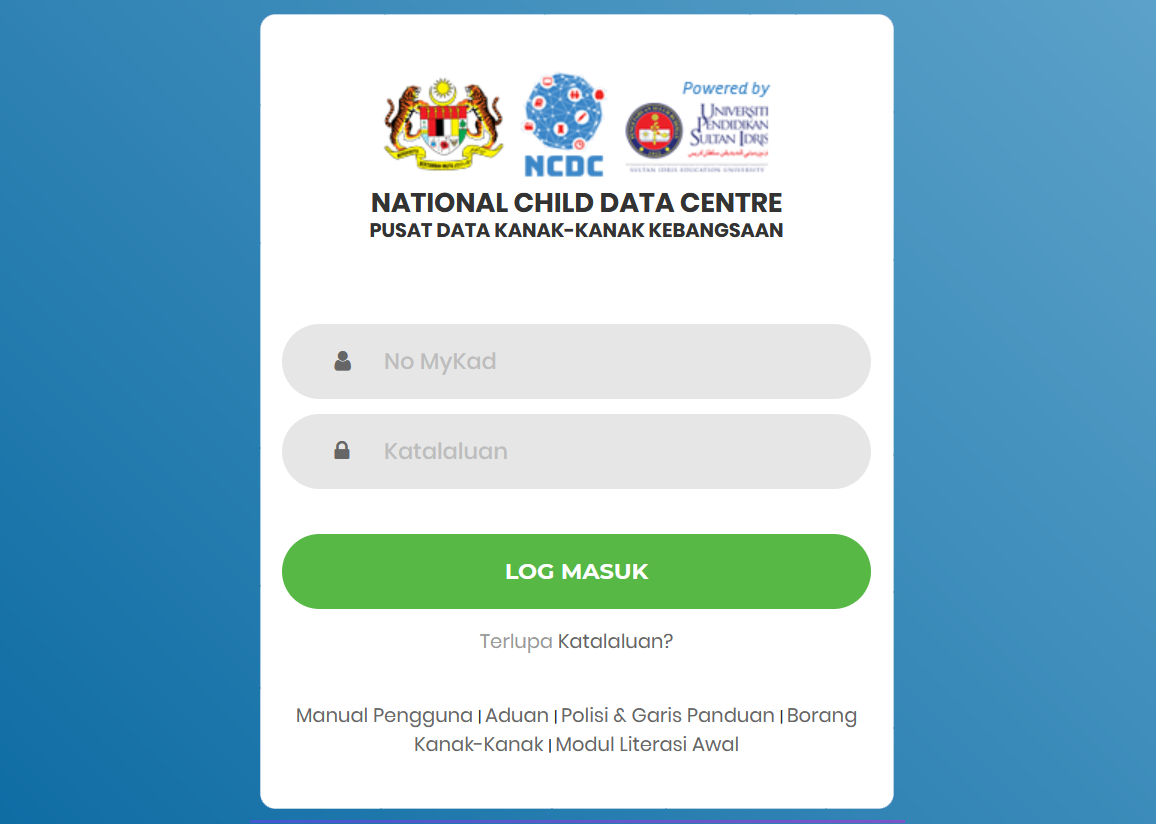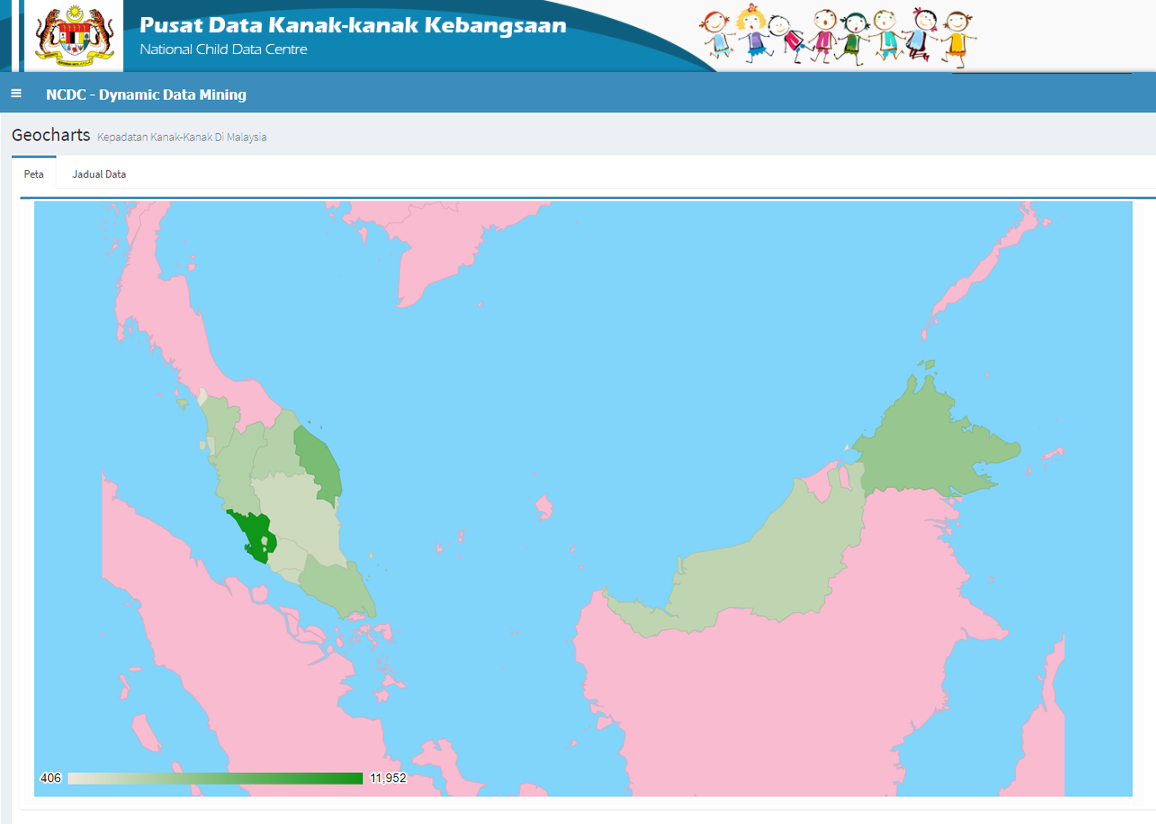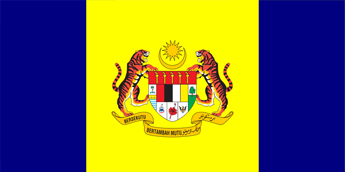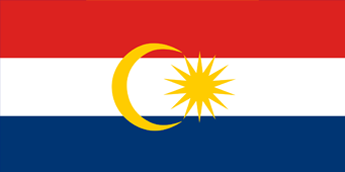National Child Development Research Centre (NCDRC) and Sultan Idris Education University (UPSI) has successfully fulfilled one of its functions, by developing an integrated database in Malaysia, namely National Child Data Centre (NCDC). This database keeps children, educators and child care centre (TASKA) comprehensive data to facilitate stakeholders (PERMATA, PERMATA, KEMAS, YPKT and SWD) to plan and implement programs that are structured and comprehensive in line with National Children's Care and Early Childhood Care Policy which emphasizes holistic development for children, from birth to 4 years old and the development of potential children based on Malaysia's reference. In short, NCDC is a web-based database that:
- collect data and profiles of children (0-3 + years), nursery and educators / caregivers.
- monitor the development of children based on the PERMATA development checklist.
- provide information related to researchers and specialists in early childhood care and education (ECCE).
- provide links to NGOs and associations linked to child care and early childhood education.
- generate reports on children, nurseries and educators for agency use and stakeholders.
NCDC possess huge amounts of data that can tell a comprehensive account about the development of a child and the ecosystem surrounding childcare centers. This data used to sit in individual repositories in agencies across the country; district, state and central government level, but now through NCDC, this information is deposited centrally and linked to build a more complete picture of Malaysian children development.
NCDRC has embarked on a feasibility study to seek opinions and analyze the feasibility to develop the database. The study conclude that there is a strong support and urgent need for the setting up of NCDC as an integrated central depository system focusing on child development data from birth to six (6) years old, to improve the provision of quality ECCE, national socio-economic development, research and policy enhancement, public inclusivity awareness programmes and empowerment in line with 10th Malaysia Plan. Given the strong support voiced for NCDRC to lead the establishment of a NCDC for Malaysia, thus, the next step is to implement the exemplary model of NCDC.
Another reasons that motivate NCDC to be developed is the adequate background of the staffs and principal for each of the TASKA are also needed to ensure the children received the best environment, the effective method of learning and to cultivate positive attitudes so that children will developed good character and will grow strong and healthy. No data was seen regarding screening to check status of mental health and criminal record of staffs. It is important to ensure that children are safe in the TASKA. Data regarding prior knowledge of teachers or staffs pertaining to the best way to take care of children, how to handle difficult children would be helpful in ensuring the children are in safe hands of the teachers and staffs. Following regulations definitely will help to ensure the wellbeing and safety of the children.
Thus, NCDC is envisioned to be the depository that has complete profile on children, TASKA’s staff and also the TASKA itself. This rich data is valuable to all stakeholders that involve with children and TASKA directly. The data can be used to structure a program for early detection and interventions, especially for the special needs children. These data collected are useful to the stakeholders in support of the implementation strategies of TASKA program expansion as well as data sources for programs involving children age as early as 3 months to 4 years old. These data may also be used for research purposes to support the implementation of the National PERMATA program in terms of child enrollment, qualification coordination and educator training and nursery and early childhood education of standardized and quality children. The NCDC system can be accessed at all times as per the requirements of registered users, and monitoring for data collections and updates are carried out by NCDRC Database Units, UPSI. Each TASKA is required to update their data at least three times a year.
To date, the NCDC system has successfully profiled more than seventy thousand children data, five thousand TASKA data, and twenty thousand TASKA’s staff data nationwide. However, the amount of child-profiled data is still low, as the number of children under for years old in Malaysia is over two million. NCDC System also expanded to include data analytics and visualization, which the team are working to produce a predictive model, an automated tool which generates a score for the occurrence of an event through the use of algorithms and large administrative data sets. The model would look at the various parameters, pulls them together and provides a summary statistic based on previous patterns of parameter that have proven to be important. This can then help identify opportunities for any intervention and improve individual child and community outcomes. With a clear understanding that the assessments developed for a national data system to monitor early childhood development and readiness should be used for assessing individual children, the following guidelines are recommended on the legal aspect:
Several sources of data pertaining young children should be considered, including the parent, the teacher or caregiver. The method of obtaining data on the child should be non intrusive. There for it is recommended both observation and one-on-one assessment are to be used to track on children development in the home as well as in early childhood centres program setting. Data pertaining young children should also be authentically observed and recorded. The system should demonstrate children’s potential at varying levels of development and not limited at the end of their early childhood period. This requires new education regulation and local jurisdiction enforced to monitor teachers’ integrity in updating every child’s progress and background details duly.
NCDC has the commercialization potential to become the data analytics hub for the nation. Analytics that produces insight are dependent on the ability to ask the “right questions” of the data as quickly as possible. Its role as the data analytics hub would not only revolves around explaining the past but also enable many answers with predictive powers that would be valuable for all the stakeholders. Raw ‘big data’ from the database itself could be integrated with other useful information or data from other databases (Department of Statistics, Ministry of Health, Community Welfare Department etc) to produce important insights that would be beneficial for policymakers, industries and other parties related or interested with children’s health and wellbeing.
